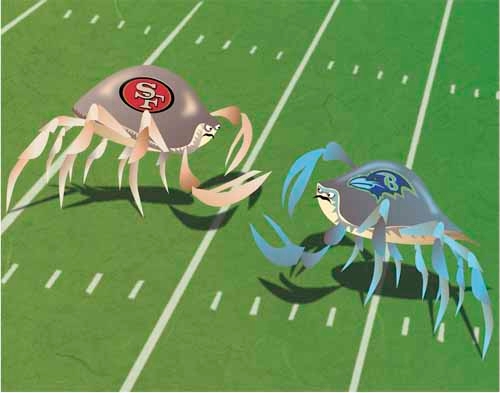Dungeness, blue crabs face off in another Super Bowl


When the San Francisco 49ers and the Baltimore Ravens take the field for Super Bowl XLVII on Sunday, it’s going to be Kaepernick vs. Flacco. Red and gold vs. purple and black. Sourdough Sam vs. Poe the Raven.
And Dungeness vs. blue.
Yes, this year’s game is, from a culinary viewpoint, the battle of the crabs. And if you think fans of the crustaceans from opposite coasts aren’t talking trash, you don’t know what the shell you’re talking about.
"I’m a Dungeness man," said Josh Crain, executive chef of Aria’s American Fish, which is part of San Francisco-based Michael Mina restaurants. "Flavor is obviously the biggest fact. I haven’t found a sweeter-tasting crab."
Try telling that to Mark Smolen, president and CEO of Nevada Seafood Wholesalers and owner of the Maryland-centric Crab Corner restaurant.
"By far the blue crab," Smolen said, "is without question, hands-down, the sweetest crab on Earth."
We have a standoff, but there may be some middle ground here.
"My take on both crabs is that I am in San Francisco," said Hubert Keller, executive chef of Fleur at Mandalay Bay and a longtime chef in the Bay Area. "By living there, I get the crabs right out of the water and they are so fresh. Maybe if I were on the East Coast, I would say the same thing."
Sean Roe, culinary director for Emeril’s Restaurants in Las Vegas, uses a lot of blue crab because Emeril Lagasse’s empire is New Orleans-based, and blue crabs also are found in the Gulf of Mexico.
"I do like the blue crabs," Roe said.
Then again …
"I think if I had to choose, I’d choose a Dungeness, but I could put up an argument for either one."
He said he likes the flavor of the Dungeness a bit more, and the fact that the large crab renders larger chunks of meat.
Keller allows that the blue crab may be a bit sweeter. But …
"I would say that doesn’t make a big difference, because I think the Dungeness has that nicer, saltier, natural flavor when you eat it."
That salty edge, Smolen said, is why the blue crab is sweeter by comparison. While Dungeness crabs are found in saltwater, he said, blue crabs dwell in brackish water.
Unlike, say, stone crab, in which case only the claws are eaten, the same parts of Dungeness and blue crabs are consumed. Smolen said the best meat in a blue crab is inside the shell, the backfin lump that’s "that little rudder piece on the back that they swim with."
"Crab legs are very flavorful," he said. "It’s a darker meat, but it’s very sweet as well. A lot of places will mix in leg meat just for the flavor, although some only buy the backfin. We use leg meat and backfin."
Crain said some of the sweetest meat in a Dungeness crab is found where the legs meet the shell.
While Crain said he thinks Dungeness and blue crabs yield a similar proportion of meat to shell, Smolen said he thinks the yield from a blue crab is higher.
Both sides agree on one thing: the best way to eat the crabs is as fresh as possible, without much in the way of adornment.
"Just steam our crabs with the spice externally," Smolen said.
Crain said that Dungeness goes with Mina’s style, which is to "let the ingredient speak for itself."
"You can make a nice crab salad where it’s just the crab, a little bit of creme fraiche, maybe just a touch of citrus zest and some herbs – thyme, parsley, tarragon, chervil," he said. "You mix that. It doesn’t take a lot of the creme fraiche, just enough to bind it and add a little bit of acidity. It’s great with everything from avocado to citrus, tomatoes in the summer."
Both concede that eating the crab is a bit of a challenge.
"There’s some work that goes with it," Crain said.
"We find it to be a labor of love, but it’s worth it," Smolen said.
Keller said that for him, the key is "experiencing something at its freshest."
But maybe not too fresh. Crain said one reason he’s not real big on blue crabs may stem from a childhood experience. Traveling on vacation, his family stopped in Annapolis, Md., for a big cooler of blue crabs. By the time they got to their campground in North Carolina, the crabs were, you might say, a bit restless.
"I ended up chasing blue crabs around the campground," Crain said. "Maybe I’m still a little mad at the crabs."
CRAB CIOPPINO
4 cooked Dungeness crabs (or 4 clusters of large snow crab or king crab legs, which are often sold frozen), cracked and steamed by the fishmonger, reserving all shells
For the cioppino broth:
Reserved crab bodies and shells (meat removed)
½ cup grapeseed oil
1 tablespoon coriander seeds
1 tablespoon fennel seeds
2 medium yellow onions, sliced thinly
2 leeks, white part only, sliced thinly
2 medium carrots, sliced thinly
1 bulb fennel, core removed and sliced thinly
2 celery stalks, sliced thinly
8 garlic cloves, sliced thinly
2 red Fresno chilies or jalapeno peppers, sliced thinly
4 tablespoons tomato paste
Stems from 1 bunch basil
1 bottle white wine
28-ounce can diced tomatoes
1 quart (4 cups) clam juice
Juice of 4 oranges
Place crabs on small baking sheet. Pull meat aside and place on another small baking sheet. Place shells in bowl and reserve for broth.
Reserve crab legs for plating. Using kitchen shears, snip a thin segment of shell out of the base of each crab leg to make it easy for guests to access the meat within. Place the snipped crab legs on a small baking sheet. Reserve remaining 1 1/3 cups crabmeat for crab toasts (recipe follows).
(If you’re using frozen crab legs, bring a large pot of water to a boil and add the king crab legs for about 10 minutes, or until they are heated through. Snow crab legs, which are slightly smaller, will be done in 6 to 8 minutes. Remove the meat by snipping through the hard exterior of the legs with kitchen shears.)
To make the cioppino broth: Break up crab shells into small pieces. Heat large stock pot over high heat. Add crab shells to the hot pan, stir, and then add grapeseed oil. Roast shells for 5 minutes.
Place coriander and fennel seeds in mesh tea ball and set aside. Add onions, leeks, carrots, fennel, celery, garlic and peppers and saute until vegetables sweat and become translucent, about 15 minutes.
Add tomato paste and stir to coat the vegetables. Continue cooking until the tomato paste is sticky and starts to brown. (The smell of the raw tomato paste will be gone and it will smell like caramelizing vegetables.)
Add basil stems and wine and de-glaze the pan, scraping up any browned bits from the bottom of the pan with a wooden spoon. Reduce the wine by half.
Stir in diced tomatoes, clam juice and orange juice. Place tea ball with spices in stew.
Reduce heat and let simmer 45 minutes.
Remove tea ball and taste the broth for spice. (If you would like it spicier at this point, add more peppers.)
Remove broth from heat and let cool slightly. Pour broth in batches into a blender and blend on low just enough to break up the shells. Push through coarse strainer. Discard shells. Return to pot.
Serve with reserved crab claws.
Serves 4.
– Recipe from Michael Mina
Crab toasts:
4 slices sourdough bread
3 tablespoons olive oil
1 1/3 cups crabmeat
½ to ¾ cup rouille (recipe follows)
1 tablespoon finely snipped chives
1 tablespoon lemon zest
½ teaspoon salt
Pepper, to taste
Heat a panini press to 380 degrees. Brush sliced bread with oil on both sides and place on panini press, leaving press open to toast only one side. Toast until bottom of bread slices have started to turn golden brown, about 1 minute. Remove bread and place on sheet pan, darker side up. (If you don’t have a panini press, you can toast them in a toaster oven.)
Mix crabmeat with rouille in a medium bowl. Add chives, lemon zest and salt. Mix thoroughly. Add rouille to dress the crab. You want the crab to be creamy but not over-dressed. Taste for seasoning and adjust if needed with salt, pepper and lemon juice.
Spread toasts with crab mixture. Cut squares of parchment the size of your bread slices and brush them with olive oil. Place oil-side-down on the crab layer. Place toasts on the panini press and let toast for 1 to 2 minutes, until the very top is golden brown. Remove toasts from press and place on sheet pan fitted with a rack. Leave paper on toasts until ready to serve. Cut each into quarters
Serves 4.
– Recipe from Michael Mina
Rouille:
2 red bell peppers
4 Fresno chilies or jalapeno peppers
1 to 1½ cups, plus 2 tablespoons, olive oil (divided use)
Salt and pepper, to taste
Zest of ½ orange
2 egg yolks
¾ cup orange juice
Juice of 1 lemon
1 cup fine breadcrumbs, toasted
1 tablespoon salt
Toss red peppers and chilies with 2 tablespoons olive oil and season with salt and pepper. Place peppers and chilies on a medium-sized baking sheet lined with foil (or on a rack over a baking sheet) and place under the broiler until the skins turn black (about 5 to 10 minutes), turning peppers as needed to blacken all sides.
Remove from oven and place peppers and chilies in a medium bowl. Cover tightly with plastic wrap and let them sit for 10-15 minutes while the steam loosens the skins. Peel skins off.
Remove stems and seeds and add the peeled and deseeded peppers to a food processor with all of the remaining ingredients except the remaining oil. Let the processor run until ingredients are well-blended together. Slowly pour oil into running processor and continue blending until emulsified.
Makes about 3 cups.
– Recipe from Michael Mina
CRAB DIP
2 pounds of cream cheese, softened (preferably Philadelphia)
1 cup mayonnaise
½ cup white wine
1 green onion, chopped
4 teaspoons chopped garlic
2 pounds blue crabmeat (preferably lump or jumbo lump)
½ cup chopped pimento
Fresh baguette
Mix all ingredients except crabmeat and baguette. Fold crabmeat into mixture and spread about an inch thick across a cookie sheet. Bake in a pre-heated 450-degree oven for 15 minutes; mix and bake 5 minutes longer.
Spread on baguette to serve.
– Recipe from Mark Smolen, Nevada Seafood Wholesalers and Crab Corner
DUNGENESS CRAB AND AVOCADO GATEAU
For salad:
1 cup Dungeness crabmeat
1 teaspoon shallot, finely minced
½ tablespoon virgin olive oil
2 teaspoons lemon juice (divided use)
1 teaspoon cilantro, finely chopped
2 tablespoons mango, diced
Salt and freshly ground pepper to taste
2 ripe avocados, peeled and pitted
5 tablespoons minced peeled and cooked asparagus
¾ cup fried thin potato julienne
For mango vinaigrette:
½ cup fresh mango puree
¼ teaspoon lemon juice
Salt and freshly ground pepper, to taste
1½ tablespoons olive oil
(You’ll also need four rings, 3 inches in diameter and 1 inch high)
For the salad, in a small mixing bowl, mix the crabmeat, shallot, olive oil, 1 teaspoon lemon juice, cilantro, mango, salt and pepper. Refrigerate.
Mash the avocados coarsely with a fork. Add salt, pepper, remaining 1 teaspoon lemon juice and asparagus. Mix gently and check seasoning, adjusting if necessary. Refrigerate.
For the vinaigrette, place the mango in a blender. Add the lemon juice, salt and pepper and process with about five on-and-off pulses, until you obtain a very smooth texture. Then gradually add the olive oil and season to taste.
To assemble the salad, place a ring in the center of each plate. Spoon a layer of avocado into the molds. Top with a layer of crab salad and cover with a second layer of avocado. Smooth with a small spatula so that the avocado is level with the top of the mold.
Carefully unmold each "cake" by lifting off the ring. Garnish the cake with the fried potato julienne. And gently spoon the vinaigrette around the avocado and crab. Serve immediately.
Serves 4.
– Recipe from Hubert Keller
BAKED CRABMEAT, ARTICHOKE AND SPINACH DIP
2 10- to 12-ounce bunches spinach, trimmed and washed
1 slice bacon, preferably apple-smoked, chopped
2 tablespoons olive oil (divided use)
1 cup finely chopped yellow onions
1 tablespoon chopped garlic
2 8-ounce packages cream cheese, at room temperature
2½ tablespoons fresh lemon juice
1 tablespoon Creole or other spicy whole-grain mustard
1 teaspoon chopped fresh tarragon or ½ teaspoon dried tarragon
1 tablespoon Worcestershire sauce
1 pound lump crabmeat, picked over for shells and cartilage
1 14-ounce can artichoke hearts, drained and coarsely chopped
1 cup shredded Monterey Jack cheese, about 4 ounces
¾ cup freshly grated Parmigiano-Reggiano, about 3 ounces (divided use)
2 large egg yolks
1¼ teaspoons salt (divided use)
½ teaspoon freshly ground white pepper
½ teaspoon cayenne
½ teaspoon hot pepper sauce
½ tablespoon unsalted butter, softened, for the baking dish
1 cup fine dried breadcrumbs
Crispy tortilla chips
Cook the spinach in a large pot of lightly salted boiling water until wilted, about 3 minutes. Drain and rinse under cold water to cool. Squeeze well to remove excess water. Coarsely chop and transfer to a bowl.
Fry the bacon in 1 tablespoon olive oil in a large skillet over medium-high heat until crisp, about 5 minutes. Add the onions and garlic and cook, stirring, until the onions are softened, 2 to 3 minutes. Add to the spinach and let cool.
Preheat oven to 350 degrees.
Beat the cream cheese, lemon juice, mustard, tarragon and Worcestershire sauce in the bowl of an electric mixer fitted with a paddle attachment or with a wooden spoon until smooth and creamy. Mix in the spinach and bacon mixture, then the crabmeat, artichoke hearts, Jack cheese, ½ cup of the Parmigiano-Reggiano, the egg yolks, 1 teaspoon of the salt, the white pepper, cayenne and pepper sauce. Mix well.
Lightly butter an 11-by-7-inch baking dish or shallow 2-quart baking dish. Pour the mixture into the dish.
Combine the remaining ¼ cup Parmigiano-Reggiano, the breadcrumbs and the remaining 1 tablespoon olive oil and ¼ teaspoon salt in a food processor or electric blender. Pulse two to three times to blend. Spread the mixture evenly over the crabmeat mixture. Bake until bubbly and lightly golden, 30 to 35 minutes.
Serve hot with the crispy tortillas chips.
Makes about 6 cups.
– Recipe from Emerils.com
Contact reporter Heidi Knapp Rinella at hrinella@review journal.com or 702-383-0474.












